
Britain isn’t a nation renowned for big moments of romance. It might work for those juke-box-blaring Americans, those Latin lovers, and all the French kissers and ciao bella Italians—but, no, not us.
If you peel back our grey skies, you’ll find something more rare. This curated selection of British love films capture our own mode of romance—movies that are aloof, cynical, even shy. Nothing wrong with that. There’s no great big ‘I LOVE YOU’ here, and if they are, we’ll use a cue card so it doesn’t come across too strong.
That, probably, is our biggest worry. The vulnerable and the tacky go hand in hand in Albion. If you’re still reading this, just know we do feel love. Deep down. Quietly. Even for you.
Now bugger off and watch our movies.
Brief Encounter (1945, David Lean)
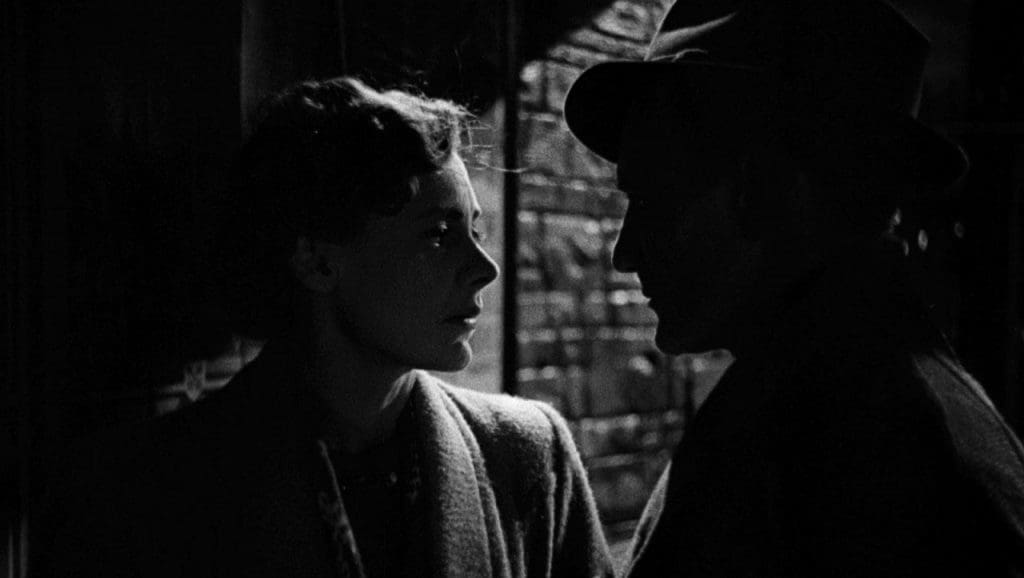
William Goldman once quipped: “There are three directors who are hot. David Lean and two others.” Based on the one-act play by Noel Coward, Brief Encounter is a masterclass in theatrical filmmaking. Two married strangers—Laura and Alec—fall into a forbidden love affair after a chance visit away from their spouses. As the innocent rendezvous takes on a romantic light, we see love at its most British: squeezed shoulders, long-glances and double-entendres are the love language par excellence for the tortured couple. With a tenderness that’s beaten back by an all-encompassing fear of being impolite, Lean’s film delights in the little details here. An atmosphere of longing is wonderfully managed by actors Celia Johnson and Trevor Howard, while Coward and Lean’s dark and comic notes are realised in Rober Krasker’s noir-influenced imagery; delivering some of the most charged black-and-white shots to ever grace the silver screen.
Darling (1965, John Schlesinger)

Directed by John Schlesinger, Darling is a scathing critique of the social mores and cultural expectations of 1960s London.
Julie Christie is a bombshell, offering a mesmerising performance as the titular character Dianna Scott—and the film is a searing portrait of a woman who will stop at nothing to achieve fame and fortune in the cutthroat world of fashion and media. Helping to bring mod fashion to the masses, The New York magazine even cited Dianna Scott as the mod’s true representative: “a new déclassé English girl…amoral, rootless, emotionally immature, and apparently irresistible.”
A tour de force in style, Schlesinger calls up every favour in London’s film world, finding more and more novel cinematic techniques to capture the highs and crushing lows of Darling‘s life. Christie’s performance is also exceptional, conveying a complex mix of ambition and cynicism that makes the character both compelling and repulsive. Although perhaps a little dated, Darling remains a powerful exploration of the darker side of celebrity culture—and the toll it can take on those who seek adoration at any cost.
Dr. Zhivago (1965, David Lean)

If Russia can claim Ukraine, we’ll claim this. Banned in the USSR, Lean’s take on Pasternack’s Russian epic charts the lives of two lovers between WWI and the Russian Civil War. It’s an epic backdrop, but the aristocratic British accents, masterclass performances by Judie Christie (yes, we’re obsessed) and Omar Sharif, coupled with enough fake snow to run in-door ski slope feels like watching a play shifting through window panes and Siberian railways—but with all the grand scope of a Russian opera. Weaved in with Maurice Jarr’s Oscar-winning balalaika infused soundtrack (you’ll never hear a score this good), this ambitious winter epic cherishes that star-crossed sense of love, capturing the mysticism of love surviving against the coldest of elements.
Alfie (1966, Lewis Gilbert)
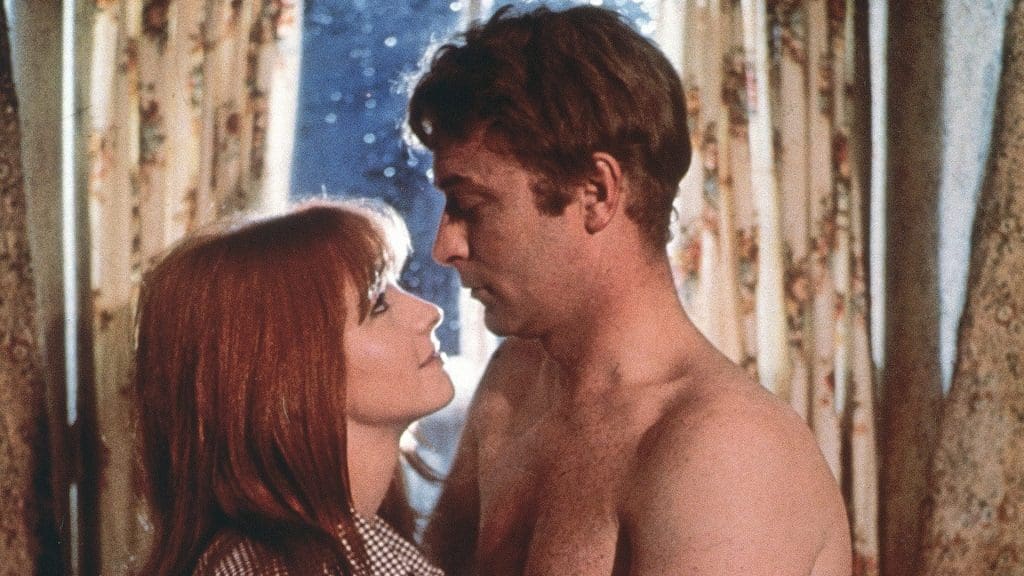
No, we’re not talking about the 2004 remake. Though Charles Shyer and Jude Law’s take on Alfie is an admirable attempt at recreating the magic of the original, it’s Michael Caine’s charming playboy that remains the Alfie we know and love. Filmed on a moderate budget of 500,000, which director Lewis Gilbert claimed was “the sort of money studio executives spend on cigar bills”, the story of a smooth-talking London bachelor who is forced to confront his own insecurities after bedding multiple women. “What’s it all about, really?”, Caine muses to the audience, sporting a clean-cut suit and his iconic Cockney accent (co-star Shelley Winters reportedly understood so little of Caine’s delivery that she would wait until he stopped moving his lips before launching into her own dialogue)—it’s questions like this that get into the subtly existential heart of Alfie, and the lonely story of its titular protagonist.
The English Patient (1996, Anthony Minghella)
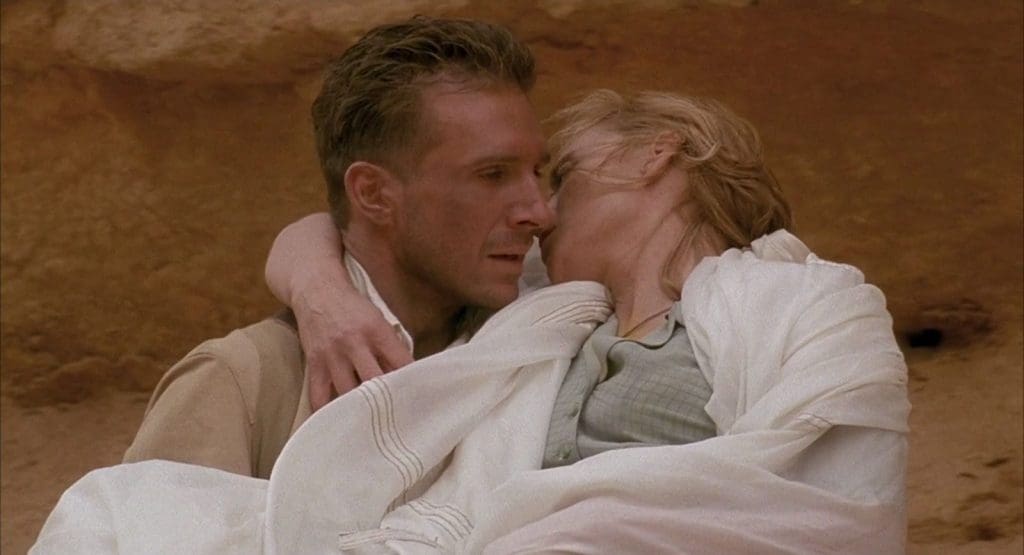
Anthony Minghella’s adaptation of Michael Ondaatje’s novel takes few liberties with the psychological premise: a WWII-era adventurer burned beyond recognition slowly recalls his past life from a hospital bed in Italy. Told through vivid flashbacks that lead up to his current injury, Ralph Fiennes, Juliette Binoche, Colin Firth and Willem Dafoe all give strong performances, but it’s the sweeping desert setpieces, operatic pacing and grandiloquent themes of love and loss that make the movie truly exceptional.
Shakespeare in Love (1998, Joe Madden)
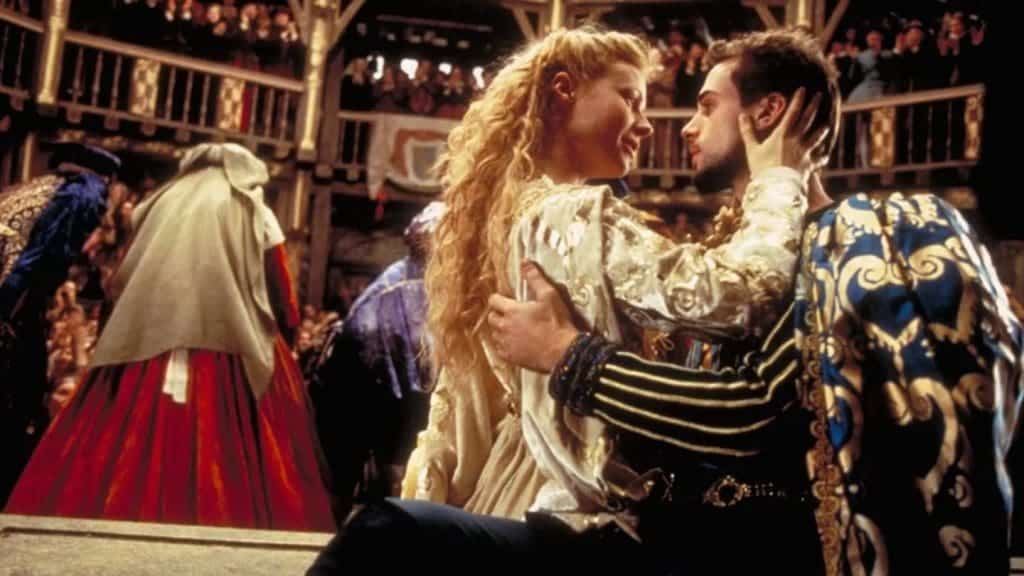
Madden’s delightful romantic comedy is a whimsical re-imagining of William Shakespeare struggling to write Romeo and Juliet. It’s no easy feat to capture the inspiration of the world’s most famous love-story, harder still to do justice to the sex life of the legendary bard who penned it, but a stellar cast, including Joseph Fiennes as Shakespeare, Gwyneth Paltrow as Viola de Lesseps, and Judi Dench as Queen Elizabeth I, help to even up the challenge.
The script is penned by one of Britain’s most iconic modern playwrights Tom Stoppard (who wrote a similar comedy play around Hamlet years past) and his input is essential to the clever wordplay and charming performances. A literary love story, this old-timey re-enactment celebrates passion’s power to inspire century to century.
Notting Hill (1999, Roger Michell)
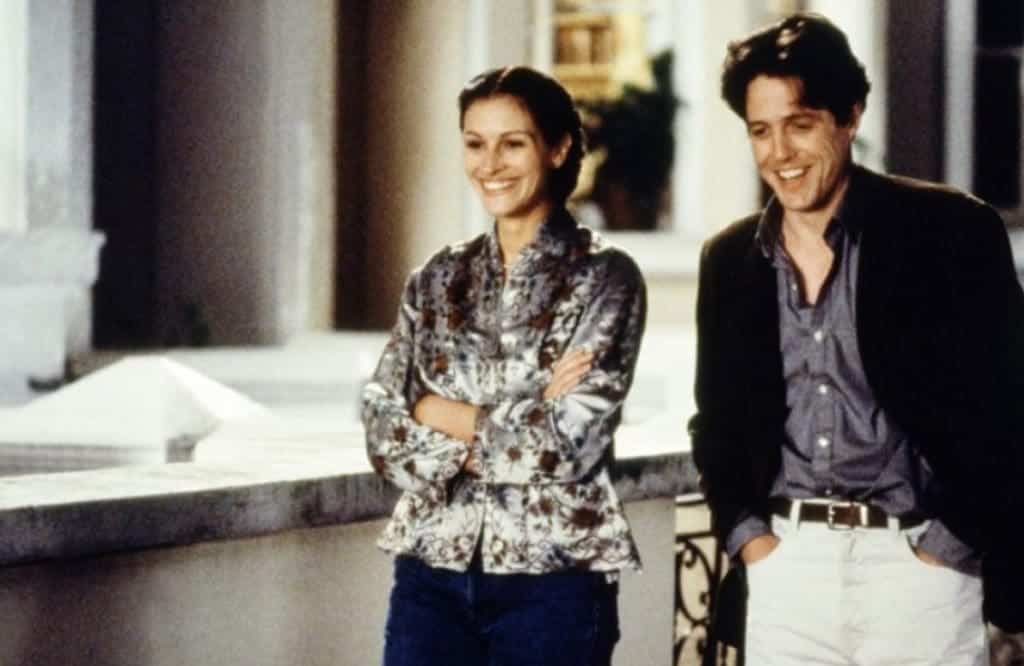
Whether you’re a film purist or a casual blockbuster lover, when you think of British romance in movies, there’s a good chance that Notting Hill will come to mind. By the time of release, Hugh Grant had been appearing in films for well over a decade, and had already established himself as an on-screen heartthrob in films like Four Weddings and A Funeral, but in our opinion, it wasn’t until his turn as Will Thacker, a boyish Notting Hill bookshop owner, that we saw his vulnerable, charismatic, and slightly awkward leading man perfected in all its unquestionably British glory. Opposite him is Julia Roberts, playing, with effortless class, Hollywood superstar Anna Scott, who wanders into Thacker’s shop. Apart, they’re charming. Together, their chemistry is off the walls, with their princess-and-the-pauper-esque dynamism shooting Notting Hill into the rom-com hall of fame.
Bend It Like Beckham (2002, Gurinder Chadha)

Like McQueen’s Lover’s Rock, Gurinder Chadha’s Bend It Like Beckham gave voice to a demographic that at the time was largely unrepresented in British film, and in the process has become widely beloved by a generation. The sports romance dramedy features Keira Knightley in her breakthrough role, but the real star of the film is Parminder Nagra as Jesminder, a British Indian girl who is pulled between the values and traditions of her Punjabi Sikh family, her love of football, and a blossoming romance with her coach, Jonathan Rhys Meyers’ Irish heartthrob Joe. Despite the American marketers of the film suggesting the title be changed to Move it Like Mia after American footballer Mia Hamm, Bend It Like Beckham remains quintessentially British, and the first-point of representation for a generation of South-Asians in the UK—as well as North Korea, who, in 2010, to celebrate ten years of relations with the UK, made Bend It Like Beckham the first ever Western-made film to be broadcast on Television there.
Weekend (2011, Andrew Haigh)
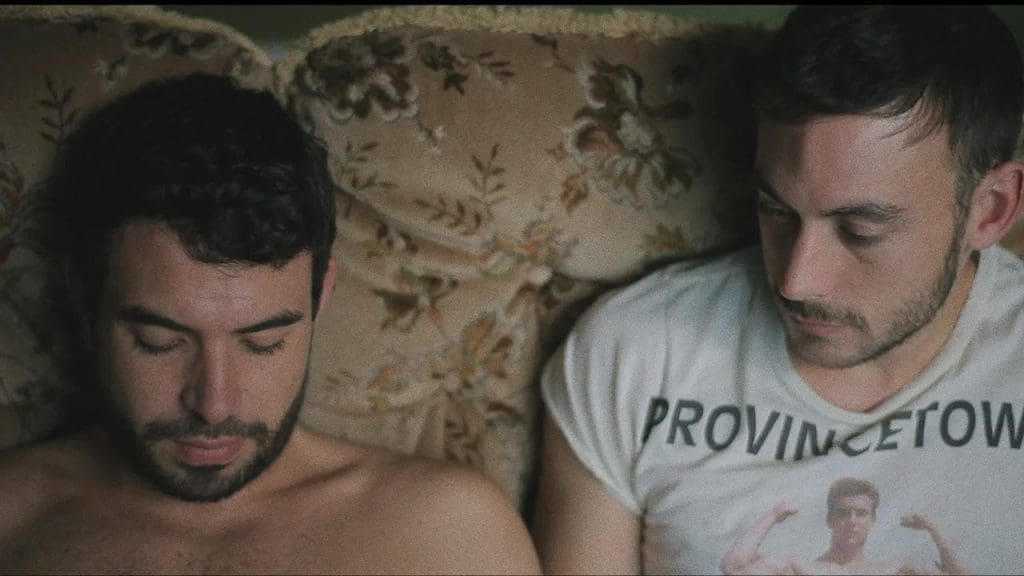
Considered one of the more recent classic British indies—Andrew Haigh’s Nottingham-set queer love story follows two men who begin dating the weekend before one is meant to leave the country. An understated portrayal of love in the modern world and fronted by breakout performances from Tom Cullen and Chris New, Weekend is uninterested in the fantasies of romance, instead preferring to probe the hard-to-manoeuvre crevices of queer dating and queer identity. Perhaps Haigh’s bold decision to tackle these themes with such knowing and tenderness is what prompted the film’s banning in over one thousand Catholic church-owned cinemas at the time of release.
Ammonite (2020, Francis Lee)
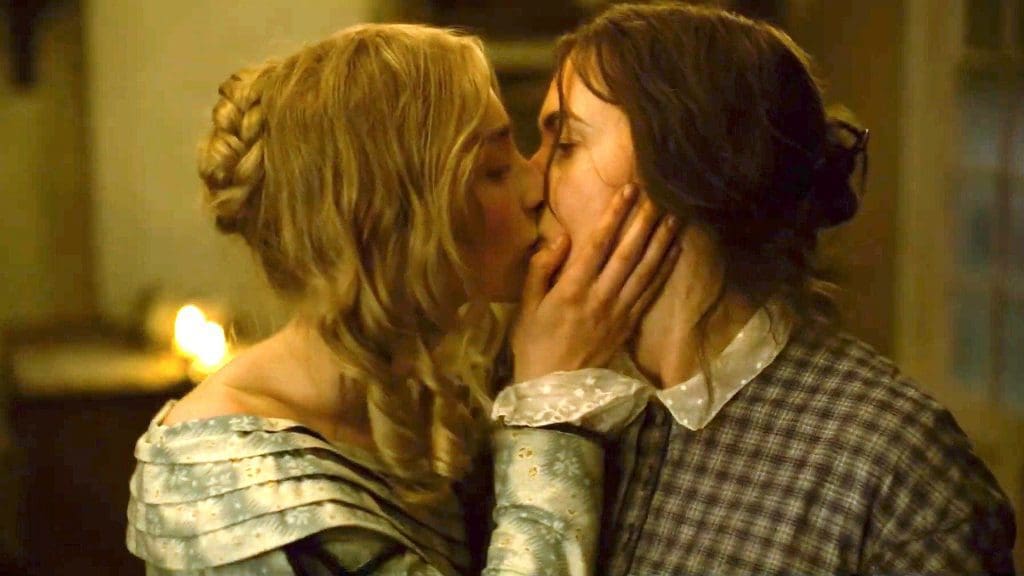
At its core, Ammonite is a beautifully shot period drama that explores the unconventional romance between two women in 19th century England. Directed by Francis Lee, the film stars Kate Winslet as Mary Anning, a renowned palaeontologist living in the seaside town of Lyme Regis, and Saoirse Ronan as Charlotte Murchison, a wealthy young woman sent to convalesce under Mary’s care.
The film is a slow burn, but there’s a quiet intensity that builds as the relationship between Mary and Charlotte deepens into romance. Winslet and Ronan give nuanced performances, conveying the repressive sexuality of their period and their own unique range with a script that rarely relies on dialogue. Stephane Fontaine’s cinematography has some of the most stunning images of Britain we’ve seen; with sweeping sea vistas and cankerous beach fossils that give an inner-life to the pair’s adventures.
Beautiful and moving, Ammonite invites viewers to take their time.
Lovers Rock (2020, Steve McQueen)

Not only is Lovers Rock the best British romance to be released over the past decade, it might just be my pick for the greatest British film to be released in the past ten years, period, and ironically, it was exclusively screened on the small screen. Broadcast on the BBC as part of Steve McQueen’s Small Axe anthology series examining the lives of West Indian immigrants in London in the 60s and 80s, Lovers Rock follows a night of romance between Franklyn (Top Boy’s Micheal Ward) and Martha (Amarah-Jae St. Aubyn) after catching each other’s eyes at a Reggae house party in West London. Though by no means overlooking the racial tensions and prejudices of the time, in Lover’s Rock, McQueen creates a safe space for black love to exist intimately and, for just a while, uninterrupted. Named after the musical movement that originated in Black-British communities in the 70s, the film’s crowning achievement arrives in the form of a glorious extended sequence as party guests sing along in chorus to Janet King’s Silly Games. A moment and movie that showcases film at its most joyful.
Rye Lane (2023, Raine Allen-Miller)

London might seem like Big Ben, Queens and glitzy towers, but there’s a lot more to the city; a depth which Miller’s short Rye Lane comically explores. Taking the viewer on a journey through one of the busiest streets in London’s Peckham neighbourhood, the film is directed by Jake Hatt and produced by Belinda Mason, and explores the hoighty-toighty bullshit of hipsters, with a candid sense of the neighbourhood’s diverse and social complexity.
Premiering at Sundance this year, Dom (David Jonson) meets Yas (Vivian Oprah) crying in a gender neutral bathroom at an art exhibit and the two ensue on a whirlwind affair. There’s a touch of Fleabag in this whimsical comedy, and excellent performances all round.





